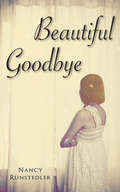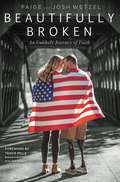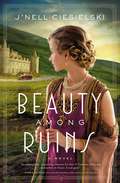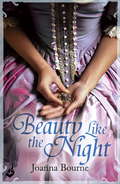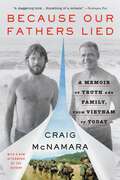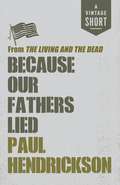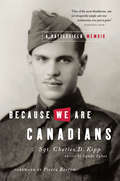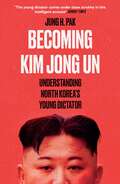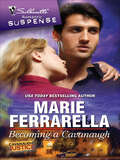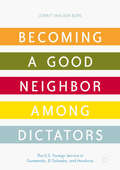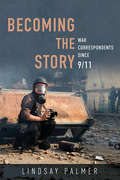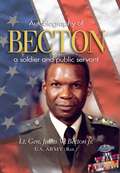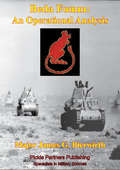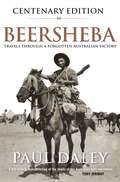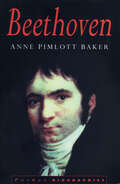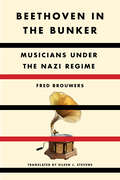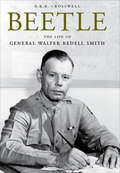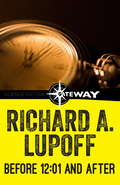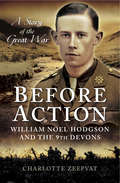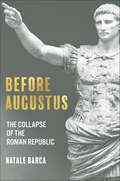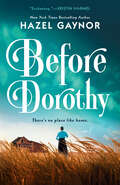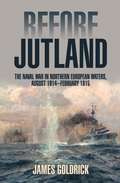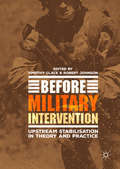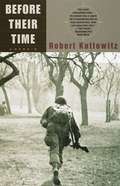- Table View
- List View
Beautiful Goodbye
by Nancy RunstedlerThe discovery of an old Ouija board sends three kids back in time to wartime 1915 to help a spirit find peace. Maggie’s life has been anything but easy lately. So when her best friend Gillian discovers a Ouija board in the attic, it’s a welcome relief. While they’d rather be at the mall than babysitting Maggie’s brother Cole, the girls figure it will be a fun way to spend a Saturday – asking questions about boys and other teenage dilemmas. After all, it’s just a game. Or is it? Thinking nothing could possibly go wrong, the kids dive in, eager to test the new game, but discover the board will change their lives in ways they couldn’t have imagined. The trio ends up with more than they bargained for and are thrust into a whirlwind journey. One from which they might never return, if they aren’t careful.
Beautifully Broken: An Unlikely Journey of Faith
by Paige Wetzel Josh WetzelRestore your faith in love and family with one Army wife's courageous story of how she helped her husband recuperate from losing both of his legs while serving in Afghanistan.Paige received the phone call that every military wife prays will never come. Her husband, Army Sergeant Josh Wetzel, stepped on an improvised explosive device while patrolling in Afghanistan. The blast resulted in the immediate loss of his legs. His survival was uncertain, and in the days to come, this traumatic incident began an unbelievable journey of faith for them as a couple. Paige's vulnerability as she struggles physically, emotionally, and spiritually, will remind you of the power of commitment and love in the face of adversity. You will discover the bravery and grit of a woman who stood behind the battle lines but faced a battle of her own to save her marriage and her family. As a military wife, Paige had to come to terms with the priorities of the military: God, Country, and then Family.
Beauty Among Ruins
by J'nell CiesielskiIn Ciesielski&’s latest sweeping romance, an American heiress finds herself in Scotland amid the fallout of the Great War, and a wounded Scottish laird comes face-to-face with his past and a woman he never could have expected.American socialite Lily Durham is known for enjoying one moment to the next, with little regard for the consequences of her actions. But just as she is banished overseas to England as a &“cure&” for her frivolous ways, the Great War breaks out and wreaks havoc. She joins her cousin in nursing the wounded at a convalescent home deep in the wilds of Scotland at a crumbling castle where its laird is less than welcoming.Alec MacGregor has given his entire life to preserving his home of Kinclavoch Castle, but mounting debts force him to sell off his family history bit by bit. Labeled a coward for not joining his countrymen in the trenches due to an old injury, he opens his home to the Tommies to make recompense while he keeps to the shadows. But his preference for the shadows is shattered when a new American nurse comes streaming into the castle on a burst of light.Lily and Alec are thrown together when a series of mysterious events threatens to ruin the future of Kinclavoch. Can they put aside their differences to find the culprit before it&’s too late, or will their greatest distraction be falling in love?Praise for Beauty Among Ruins&“An atmospheric, engrossing romance for fans of Downton Abbey and Somewhere in France. A real gem!&” —Aimie K. Runyan, internationally bestselling author&“A satisfying and highly enjoyable read that I recommended for readers of historical fiction, mystery, and romance.&” —Tea Cooper, author of The Woman in the Green DressWorld War I historical romanceFull-length stand-alone novelBook length: 113,000 wordsIncludes discussion questions for book clubs
Beauty Like the Night: Spymaster 6 (Spymaster)
by Joanna BourneIn Beauty Like The Night, Joanna Bourne, 'master of romance and suspense' (Teresa Medeiros) returns to the French Revolution, with a stirring tale of intrigue, espionage, and irresistible attraction. For fans of Stephanie Laurens, Elizabeth Hoyt For fans of Stephanie Laurens, Elizabeth Hoyt and Poldark, this is a must-read. Severine de Cabrillac, orphan of the French revolution and sometime British intelligence agent, has tried to leave spying behind her. Now she devotes herself to investigating crimes in London and finding justice for the wrongly accused.Raoul Deverney, an enigmatic half-Spaniard with enough secrets to earn even a spy's respect, is at her door demanding help. She's the only one who can find the killer of his long-estranged wife and rescue her missing fourteen-year-old daughter.Severine reluctantly agrees to aid him, even though she knows the growing attraction between them makes it more than unwise. Their desperate search for the girl unleashes treason and murder...and offers a last chance for two strong, wounded people to find love.For more spellbinding Spymasters romance, look for the other titles by Joanna Bourne: The Forbidden Rose, The Spymaster's Lady, My Lord and Spymaster, The Black Hawk and Rogue Spy.
Because Our Fathers Lied: A Memoir of Truth and Family, from Vietnam to Today
by Craig McNamaraThis unforgettable father and son story confronts the legacy of the Vietnam War across two generations: &“an important book that should be read by every American&” (Ron Kovic, Vietnam Veteran and author of Born on the Fourth of July). Craig McNamara came of age in the political tumult and upheaval of the late 60s. While Craig McNamara would grow up to take part in anti-war demonstrations, his father, Robert McNamara, served as John F. Kennedy's Secretary of Defense and the architect of the Vietnam War. This searching and revealing memoir offers an intimate picture of one father and son at pivotal periods in American history. Because Our Fathers Lied is more than a family story—it is a story about America. Before Robert McNamara joined Kennedy's cabinet, he was an executive who helped turn around Ford Motor Company. Known for his tremendous competence and professionalism, McNamara came to symbolize "the best and the brightest." Craig, his youngest child and only son, struggled in his father's shadow. When he ultimately fails his draft board physical, Craig decides to travel by motorcycle across Central and South America, learning more about the art of agriculture and making what he defines as an honest living. By the book's conclusion, Craig McNamara is farming walnuts in Northern California and coming to terms with his father's legacy. Because Our Fathers Lied tells the story of the war from the perspective of a single, unforgettable American family.
Because Our Fathers Lied: from The Living and the Dead
by Paul HendricksonRobert S. McNamara was the official face of Vietnam, the technocrat with steel-rimmed glasses and an ironclad faith in numbers who kept insisting that the war was winnable long after he had ceased to believe it was. In his insightful, morally devastating book, The Living and the Dead, Paul Hendrickson juxtaposes Robert S. McNamara's story with those of a wounded Marine, an Army nurse, a Vietnamese refugee, a Quaker who burned himself to death to protest the war, and an enraged artist who tried to kill the man he saw as the war's architect. This is the brilliant, emotional coda where, in meticulous yet compassionate prose, Hendrickson captures his chase after the story of the man and the haunted years of McNamara’s life after Vietnam. A Vintage Shorts Vietnam Selection. An ebook short.
Because We Are Canadians: A Battlefield Memoir
by Charles KippThis is the story of one man's war--the memoirs of Sgt. Charles D. Kipp, who served with the Canadian army on active duty in Europe during the bloody days and weeks following D-Day. What makes this work stand out from other Second World War battlefield journals is its unadorned, almost naive sense--a guileless attention to small details, horrific and beautiful, that Kipp recalls from his experiences. First published in 2003, this is a must-read, not only for veterans of the War and military history buffs, but also for anyone who seeks to understand what ordinary soldiers endured during the Second World War. Charles d. Kipp was wounded nine times during ten months of fighting at the front during the Second World War. After the war, he farmed briefly before being diagnosed with post-traumatic stress syndrome and suffering a second heart attack. He passed away in January 2000.
Because of You
by Jessica ScottFrom the war-torn streets of Baghdad to the bittersweet comforts of the home front, two wounded hearts navigate the battlefield of coming home from war in this explosive eBook original from newcomer Jessica Scott. Keeping his men alive is all that matters to Sergeant First Class Shane Garrison. But meeting Jen St. James the night before his latest deployment makes Shane wonder if there's more to life than war. He leaves for Iraq remembering a single kiss with a woman he'll never see again--until a near fatal attack lands him back at home and in her care. Jen has survived her own brush with death and endured its scars. And yet there's a fire in Shane that makes Jen forget all about her past. He may be her patient, but when this warrior looks her in the eyes, she feels--for the first time in a long time--like a woman. Shane is too proud to ask for help, but for Jen, caring for him is more than a duty--it's a need. And as Jen guides Shane through the fires of healing, she finds something she never expected--her deepest desire.Includes a special message from the editor, as well as excerpts from these Loveswept titles: This Fierce Splendor, Spellbound, and Tender, Loving Cure.
Becoming Kim Jong Un: Understanding North Korea’s Young Dictator
by Jung H. Pak&‘The young dictator comes under close scrutiny in this intelligent account' Sunday Times The mysterious, brutal, and calculating Kim Jong Un has risen to become the unchallenged dictator of a nuclear rogue state. He now possesses weaponry capable of threatening America and its allies, and his actions have already significantly changed global politics. It&’s believed that Kim Jong Un is in his thirties, only a few years into what will likely be decades of leadership. He is in the news almost every day, and yet we still know almost nothing about him and how he became the supreme leader of the hermit kingdom. Former CIA analyst and North Korea expert Jung H. Pak reveals the explosive story of Kim Jong Il&’s third son: the spoilt and impetuous child, the mediocre student, the ruthless murderer, the shrewd grand strategist.
Becoming a Cavanaugh (Cavanaugh Justice #15)
by Marie FerrarellaSomeone was murdering the city's elite, and anyone could be next. Assigned to the case was Detective Kyle O'Brien, whose new partner was the blond, blue-eyed Jaren Rosetti, as sunny as Kyle was dark. Not to mention too irresistible for her own good. But their growing attraction had to be pushed aside as the horrific killer swept through the urban landscape. Kyle knew he was falling hard for his obstinate partner, who had a will of her own. While they deciphered the psychopath's code, the killer prepared to strike again—this time dangerously close to home.
Becoming a Good Neighbor among Dictators: The U.S. Foreign Service in Guatemala, El Salvador, and Honduras
by Jorrit van den BerkVery few works of history, if any, delve into the daily interactions of U. S. Foreign Service members in Latin America during the era of Roosevelt's Good Neighbor Policy. But as Jorrit van den Berk argues, the encounters between these rank-and-file diplomats and local officials reveal the complexities, procedures, intrigues, and shifting alliances that characterized the precarious balance of U. S. foreign relations with right-wing dictatorial regimes. Using accounts from twenty-two ministers and ambassadors, Becoming a Good Neighbor among Dictators is a careful, sophisticated account of how the U. S. Foreign Service implemented ever-changing State Department directives from the 1930s through the Second World War and early Cold War, and in so doing, transformed the U. S. -Central American relationship. How did Foreign Service officers translate broad policy guidelines into local realities? Could the U. S. fight dictatorships in Europe while simultaneously collaborating with dictators in Guatemala, El Salvador, and Honduras? What role did diplomats play in the standoff between democratic and authoritarian forces? In investigating these questions, Van den Berk draws new conclusions about the political culture of the Foreign Service, its position between Washington policymakers and local actors, and the consequences of foreign intervention.
Becoming the Story: War Correspondents since 9/11
by Lindsay PalmerThe September 11 attacks produced changes in journalism and the lives of the people who practiced it. Foreign reporters felt surrounded by the hate of American colleagues for "the enemy." Americans in combat areas became literal targets of anti-U.S. sentiment. Behind the lines, editors and bureau chiefs scrambled to reorient priorities while feeling the pressure of sending others into danger. Becoming the Story examines the transformation of war reporting in the decade after 9/11. Lindsay Palmer delves into times when print or television correspondents themselves received intense public scrutiny because of an incident associated with the work of war reporting. Such instances include Daniel Pearl's kidnapping and murder; Bob Woodruff's near-fatal injury in Iraq; the expulsions of Maziar Bahari and Nazila Fathi from Iran in 2009; the sexual assault of Lara Logan; and Marie Colvin's 2012 death in Syria. Merging analysis with in-depth interviews of Woodruff and others, Palmer shows what these events say about how post-9/11 conflicts transformed the day-to-day labor of reporting. But they also illuminate how journalists' work became entangled with issues ranging from digitization processes to unprecedented hostility from all sides to the political logic of the War on Terror.
Becton
by Julius Becton Jr.This autobiography, published in cooperation with the Association of the United States Army (AUSA), highlights Lt. Gen. Becton's remarkable career and reveals the influences that contributed to his success. Becton's autobiography reflects on his youth in the suburban Philadelphia area, his parental and family influences, and his almost forty years of service in the U.S. Army and in subsequent civilian appointments. His devotion to leadership, education, service, race, and his spiritual upbringing are all central themes in the book.After finishing high school, Becton entered a segregated Army at age eighteen and over nearly forty years rose to the rank of lieutenant general. Two years after enlisting in the Army Air Corps Enlisted Reserve, he was commissioned a second lieutenant of infantry and subsequently fought with distinction in the Korean War. Integrated into the Regular Army in 1951, he went on to earn undergraduate and graduate degrees in mathematics and economics and held combat commands in the 101st Airborne Division in Vietnam. He commanded the legendary 1st Cavalry Division in 1975-76. Promoted to lieutenant general in 1978, he served as commanding general of the U.S. VII Corps in Germany and deputy commander of Training and Doctrine Command and the Army Inspector of Training before retiring in 1983.Following retirement he entered fields of international disaster assistance, emergency management, and education. Becton joined the Reagan administration in 1984 as Director of the Office of Foreign Disaster Assistance for the Agency for International Development. From 1985 to 1989 he was Director of the Federal Emergency Management Agency. Over the next six years, he was the COO of American Coastal Industries and president of Prairie View A&M University. His final civilian post was as CEO/Superintendent of public schools in the District of Columbia.Becton was listed several times by Ebony magazine as 'One of the 100 Most Influential Blacks in America.' In 2007 he was selected to receive the George Catlett Marshall Medal, the highest award presented by the Association of the U.S. Army (AUSA) for being a 'soldier, combat commander, administrator, educator, public servant, government leader, and role model.'
Beda Fomm: An Operational Analysis [Illustrated Edition]
by Major James G. BierwirthIncludes the War in North Africa Illustration Pack - 112 photos/illustrations and 21 maps.This study analyzes the Army's doctrinal definition of the battlefield framework through examination of British operations against the Italians in North Africa during the period, June 1940 through February 1941. This example illustrates how commanders can consider the battlefield framework in organizing combat power. The study examines how commanders at the tactical and operational levels of war use the concepts of area of operations, battle space, and battlefield organization. This study also shows why tactical and operational commanders must consider each other's battlefield framework. It shows how actions in one commander's framework affects the other's. This study analyzes, through the battlefield framework, General Wavell's actions as the operational commander and their effects on the tactical commander, Lieutenant General O'Connor. Additionally, the study analyzes Lieutenant General O'Connor's battlefield framework and how actions at the tactical level created opportunities for the operational commander.
Beersheba Centenary Edition: Travels through a forgotten Australian victory
by Paul DaleyA hundred years ago in October 1917 members of the 4th Australian Light Horse Brigade participated in what is now regarded as the last great successful cavalry charge. Waving bayonets overhead in the dying light, they raced across six kilometres of exposed ground in Palestine, surprising the well-entrenched Turks. It was the decisive blow in the British capture of the strategic stronghold of Beersheba. The story of this remarkable military victory has largely slipped through the cracks of history, eclipsed in Australian sentiment by stories of dramatic defeat and loss at Gallipoli and on the Western Front. Paul Daley goes in search of the story of Beersheba. What he uncovers is a story of ordinary men capable of extraordinary acts, as he sheds new light on a dark episode starkly at odds with the Anzac mythology.
Beethoven
by Anne Pimlott BakerConsidered by many the world’s greatest composer, Ludwig van Beethoven achieved his ambitions against the difficulties of a bullying and drunken father, growing deafness and mounting ill-health. Here, Anne Pimlott Baker tells the story of the German composer’s life and work, from his birth in Bonn in 1770 and his early employment as a court musician, to his death in Vienna in 1827. She describes his studies with Haydn in Vienna and his work during the French Revolution and the rise of Napoleon. His most financially successful period followed the Congress of Vienna in 1815, despite several unhappy love affairs and continuous worry over his nephew, Karl. Beethoven is a concise, illuminating biography of a true virtuoso.
Beethoven in the Bunker: Musicians Under the Nazi Regime
by Fred BrouwersThis compelling survey examines the remarkable relationship between the Nazis and classical music through the stories of musicians, composers, and conductors across the political spectrum.May 1945. A Soviet military patrol searches Hitler&’s secret bunker in Berlin. They find bodies, documents, jewelry, paintings—and also an extensive collection of 78 rpm records. It comes as no surprise that this collection includes work by Beethoven, Wagner, and Bruckner. The same goes for a procession of other giants promoted by the Nazi regime: &“It seems as if the Nazis put a steel helmet on Mozart, girded Schubert with a saber, and wrapped barbed wire around Johann Strauss&’s neck,&” composer Robert Stolz once said. But how is it possible that Hitler&’s favorites also included &“forbidden&” Jewish and Russian composers and performers? While Hitler sat secretly enjoying previously recorded music in his bunker, musicians made of flesh and blood were denied a means of making a living. They died in concentration camps or in other war-related circumstances. They survived but ended up in psychiatric care; they managed to flee just in time; they sided with the regime—out of conviction or coercion—or they joined the resistance. From fiery conductor Arturo Toscanini, who defied Mussolini and Hitler, to opportunistic composer Richard Strauss and antisemitic pianist Elly Ney, who collaborated with the Third Reich to varying extents and for different reasons, Fred Brouwers profiles the complex figures of this extraordinarily fascinating chapter in music history.
Beetle: The Life of General Walter Bedell Smith (American Warriors Series)
by D.K.R. CrosswellThis biography recounts one of the most significant yet unsung military careers of the twentieth century: &“a major contribution to the history of World War II&” (Foreign Affairs). General Walter Bedell Smith began his public service career of more than forty years at age sixteen, when he joined the Indiana National Guard. His bulldog tenacity earned him an opportunity to work with General George C. Marshall in 1941, playing an essential role in formation of the Combined and Joint Chiefs of Staff. After his appointment as chief of staff to Dwight D. Eisenhower in 1942, Smith took a central part in planning the major Allied operations of World War II in Europe. Among his many duties, Smith negotiated the surrenders of the Italian and German armed forces in 1945. Smith&’s postwar career included service as the US ambassador to the Soviet Union, director of the Central Intelligence Agency, and undersecretary of state. In Beetle, D. K. R. Crosswell offers the first full-length biography of the general, including insights into his close relationships with Marshall and Eisenhower. Meticulously researched and long overdue, Beetle sheds new light on Eisenhower as supreme commander, as well as the WWII campaigns in North Africa, Italy, and Europe.
Before 12:01 and After
by Richard A. LupoffBefore 12:01 and After is a collection of science fiction, fantasy, mystery and horror stories by Richard A. Lupoff, collecting the best of his short fiction from his long writing career. It contains the following stories:"Mr. Greene and the Monster""BOOM!""Incident in the 14th St. BMT""After the Dreamtime""12:01 P.M.""Venus-Ah, Venus!""With the Evening News""Saltzman's Madness""God of the Naked Unicorn""Nebogipfel at the End of Time""Mort in Bed""Stroka Prospekt""Two Sort-Of Adventures""Blinky Henderson Again""The Digital Wristwatch of Philip K. Dick""Snow Ghosts""Triptych""The House on Rue Chartres""The Doom That Came to Dunwich""The Woodstock West Killer""Easy Living""Dogwalker""A Funny Thing Happened..."
Before Action: William Noel Hodgdon and the 9th Devons, A Story of the Great War
by Charlotte ZeepvatWilliam Noel Hodgson never intended to be a soldier; he wanted to write. The Great War made his reputation as a poet but it also killed him. This groundbreaking biography traces his path through the pre-war world and explores why he set his own hopes and plans aside to join the army. His story is personal but it evokes the experience of a generation.A hundred years on, Hodgson is not only remembered for his poetry. He has become one of the best-known casualties of the first day of the Battle of the Somme, the most deadly day in British military history. His own unit, the 9th Battalion, The Devonshire Regiment, lost well over half the men who went over the top that morning and every officer but one: dead, wounded or missing, most in the first half-hour.Before Action draws on Hodgsons own writing and on the unpublished letters and diaries of his fellow officers to recreate the experiences of a 1914 volunteer battalion. Through their eyes we see everything from the lighter moments of soldiering to battle at its most violent: at Loos, where Hodgson won the Military Cross, and the opening day of the Somme offensive. The book offers an important new explanation of what happened to the 9th Devons that fateful morning. It uncovers the hidden meanings behind some of Hodgsons most familiar poems, and its wider themes of family and friendship, war, grief and remembrance, are universal.
Before Augustus: The Collapse of the Roman Republic
by Natale Barca"...the author does an admirable job of showing just how complicated and interconnected all the great patrician families were and how their jealousies and rivalries ultimately led to their undoing and the end of the great Roman Republic." — New York Journal of BooksThe political process that culminated in the transition from Republic to Empire in ancient Rome began with the military reform of Caius Marius in the last decades of the 2nd century BC. Following the Civil War and Sulla’s dictatorship, it developed further with the First Triumvirate of Caesar, Pompey, and Crassus, and two further civil wars. These wars, which saw Caesar pitted against Pompey, and Octavian fighting Anthony, ended in 27 BC with the rise to power of Octavian, the adoptive son of Caesar. Before Augustus outlines a summary of the last years of the Roman Republic, weaving together the military, political, and social aspects. Scholar Natale Barca sets the protagonists within the complex societal and political system that they operated, analyzing their actions, and the epic battles that ensued.
Before Dorothy
by Hazel GaynorLong before Dorothy visits Oz, her aunt, Emily Gale, sets off on her own grand adventure, leaving gritty Chicago behind for Kansas and a life that will utterly change her, in this transporting novel from New York Times bestselling author Hazel Gaynor.As featured in People ∙ Us Weekly ∙ Woman's World ∙ and more!Chicago, 1924: Emily and her new husband, Henry, yearn to leave the bustle of Chicago for the promise of their own American dream among the harsh beauty of the prairie. But leaving the city means leaving Emily&’s beloved sister, Annie, who was once closer to her than anyone in the world.Kansas, 1932: Emily and Henry have established their new home among the warmth of the farming community in Kansas. Aligned to the fickle fortunes of nature, their lives hold a precarious and hopeful purpose, until tragedy strikes and their orphaned niece, Dorothy, lands on their doorstep.The wide-eyed child isn&’t the only thing to disrupt Emily&’s world. Drought and devastating dust storms threaten to destroy everything, and her much-loved home becomes a place of uncertainty and danger. When the past catches up with the present and old secrets are exposed, Emily fears she will lose the most cherished thing of all: Dorothy.Bursting with courage and heart, Before Dorothy tells the story of the woman who raised a beloved heroine, and ponders the question: what is the true meaning of home?
Before Jutland
by James GoldrickBefore Jutland is an effort to understand what happened at sea in northern European waters in 1914-15 when the German High Sea Fleet faced the Grand Fleet in the North Sea and the Russian Fleet in the Baltic. The book is an extensively revised and extended version of the author’s 1984 work The King’s Ships Were at Sea. It covers the first six months of the First World War because very important things occurred in that time and, despite the loose ends that inevitably remain with four more years of conflict to follow, important things can be said. The focus is primarily on the British, but both the Germans and the Russians are integral to the study because neither the British nor the Germans’ North Sea activities can be fairly assessed without giving due weight to the Baltic theatre of operations. This is an operational history, which balances coverage of the major incidents with treatment of the continuum of activity. The intent within the scene setting chapters is not to attempt a complete survey of the events of the previous decade, but to situate each navy within the environment of 1914. Before Jutland includes the battles of Heligoland Bight and the Dogger Bank, as well as the shock of the submarine and its effect on the operations of all the protagonists. In analyzing these events, it seeks to provide the context within which the protagonists were actually working, without the application of excessive hindsight, because in 1914 so much was new and experimental. Observers are inclined to consider what is known as the 'Fisher Era’ as a continuum from Admiral Fisher’s accession as First Sea Lord in the British Admiralty in 1904; in reality the pace of operational development not only accelerated but became truly multi-lane only after about 1909, just before the great reformer went into his first retirement. The pressures at all levels within navies were therefore intensifying in the years immediately before the outbreak of the war in ways that were not fully understood, nor necessarily recognized. In short, those involved were struggling to learn a new language of naval operations and warfare with an incomplete dictionary and very little grammar. In all, Before Jutland tries to show not only what happened, but how the services evolved to meet the challenges that they faced at the opening of the Great War and whether or not that evolution was successful.
Before Military Intervention: Upstream Stabilisation In Theory And Practice
by Robert Johnson Timothy ClackThis book explores the natures of recent stabilisation efforts and global upstream threats. As prevention is always cheaper than the crisis of state collapse or civil war, the future character of conflict will increasingly involve upstream stabilisation operations. However, the unpredictability and variability of state instability requires governments and militaries to adopt a diversity of approach, conceptualisation and vocabulary. Offering perspectives from theory and practice, the chapters in this collection provide crucial insight into military roles and capabilities, opportunities, risks and limitations, doctrine, strategy and tactics, and measures of effect relevant to operations in upstream environments. This volume will appeal to researchers and practitioners seeking to understand historical and current conflict.
Before Their Time: A Memoir
by Robert Kotlowitzin this memoir of his experiences as a teenage infantryman in the US Third Army during World War II, Kotlowitz brings to life the harrowing story of the massacre of his platoon in northeastern France, in which he--by playing dead--was the only one to survive. 208 pp. 15,000 print.From the Hardcover edition.
